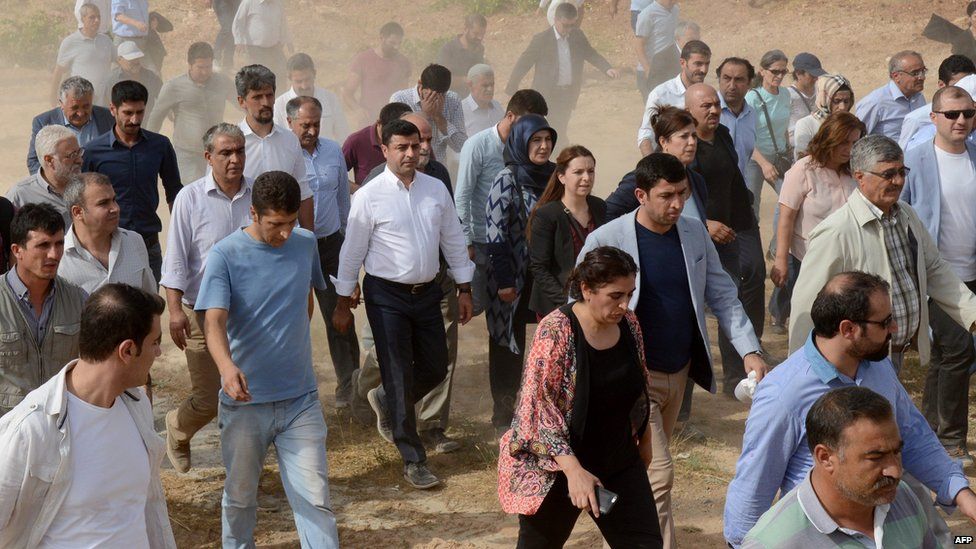Turkey Kurds: Many dead in Cizre violence as MPs' march blocked
- Published

At least 30 people have died in clashes in the Turkish town of Cizre since a military operation began there last week, Turkey's interior ministry says.
The ministry says most of the dead were Kurdish militants but the pro-Kurdish Peoples' Democratic Party (HDP) says 20 civilians were killed in the violence.
Locals say Cizre has been "under siege" since the military imposed a curfew.
On Thursday police stopped a delegation of HDP leaders who were trying to reach the south-eastern city on foot.
The group includes the party's leader Selahattin Demirtas and 30 members of parliament, who say they want to draw attention to what is happening in the mainly Kurdish area.
They were intercepted by police near Idil, 28km (17 miles) from Cizre.
Deadly clashes between Turkish forces and the militant Kurdish organisation, the PKK, have intensified since a ceasefire collapsed in July.
Turkish jets have bombed PKK bases in northern Iraq and the army has boosted security and imposed curfews across the south-east.
Mr Demirtas said the humanitarian situation in Cizre was worsening, with people unable to buy bread or access water.
The body of a 10-year-old boy killed in the violence was being kept in a refrigerator by family members because restrictions on movement meant they could not take him to the mortuary, the BBC was told.
Meryem Sune, a 53-year-old mother of seven, could not be buried for two days and her body was first kept cold by ice bottles, local reports said.
Ms Sune was hit by shrapnel and died of her injuries because she was not allowed into hospital for treatment.
Asiye, an eyewitness from Cizre's Nur neighbourhood, told the BBC that Turkish security forces had not just besieged the town but also were operating inside, blocking access between different neighbourhoods.
He also talked about seeing a crowd carrying a 14-year-old injured boy to a place where people hoped he would be picked up by an ambulance.
Turkish Interior Minister Selami Altinok said the curfew would continue until the military operation was completed.
The ministry also said the HDP delegation had not been allowed into Cizre because of security concerns.
But Saruhan Oluc, one of HDP lawmakers trying to get to the town, said such statements were groundless.
"We don't believe we face any threats from the people of the town. The only threat we face is from the soldiers who block our way and don't let us in," he told the BBC.
Mr Demirtas warned the country was heading towards civil war.
Turkish prosecutors are currently investigating the HDP leader for insulting the president.
They want to have the MP stripped of his parliamentary immunity.
Separately, the interim government has deported a Dutch journalist.
Freelancer Frederike Geerdink, who was arrested on Sunday, was accused of links to the PKK.
Earlier in the month, two British journalists with Vice News were deported. Their Iraqi colleague remains in detention.
More than 40,000 people have died since the PKK launched an armed campaign in 1984, calling for an independent Kurdish state within Turkey.
The ceasefire that began in 2013 unravelled in July, after a suicide bombing by suspected Islamic State militants near the border with Syria.
The attack led to mutual recriminations between Kurdish groups and Turkey.
- Published9 September 2015
- Published9 September 2015
- Published2 September 2015
- Published23 August 2016